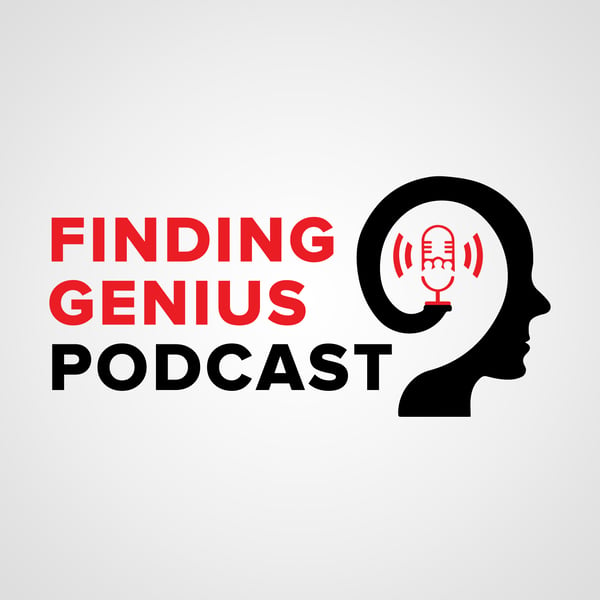Silicon Reporting – Matt Richtel, Pulitzer Prize-winning Tech Reporter for The New York Times – The World Through Silicon Valley Eyes—Technology & The Human Experience
Finding Genius Podcast
Richard Jacobs
4.4 • 1K Ratings
🗓️ 5 August 2019
⏱️ 29 minutes
🧾️ Download transcript
Summary
Matt Richtel, Pulitzer Prize-winning tech reporter for The New York Times, talks about his background and work, covering technology and Silicon Valley.
As a celebrated author and Pulitzer Prize-winning reporter for The New York Times, Richtel has been, to say the least, a little busy, and in demand. He is an outspoken voice on many and varied subjects, such as science and technology, business, cancer immunotherapy, and technology’s effect on behavior as well as the brain. His work has also focused on the dot com boom (and subsequent bust), venture capital, startups, and all that is… Silicon Valley.
Richtel talks about his vast background studying, researching, and reporting on Silicon Valley. The author and reporter discuss how he came to write his book, The Man Who Wouldn’t Die, a comedic detective novel set in Silicon Valley that Richtel penned under a nom de plume that he humorously refers to as his nom de guerre. Richtel explains how he and his publisher came to the idea that they should publish it under a pen name. As he explains, after a lifetime of serious reporting, they decided that the public should have a little warning that this book was a great departure from the usual reporting Richtel delivers, and is celebrated for.
The Pulitzer Prize winner muses about some of the early history of sports reporting, and how a program would gather facts and data to assemble a story. Further, he makes the connection to universal income as he talks about automation. Richtel discusses his thoughts on universal basic income and states that while he sees both sides as a journalist, it is certainly a conversation worth having, as automation is taking over jobs, livelihoods, and family incomes.
Richtel talks about choices that people have available to them, and how especially in Silicon Valley, the entrepreneurial spirit leaches into literally everything. He discusses the advantages of technology and all that it has brought forth but underscores that even with such innovative changes that have made our lives better, technology has still failed to solve our existential challenges.
Richtel won the Pulitzer Prize for National Reporting, for a series of groundbreaking articles on the hazardous use of cell phones, computers, and various other devices during driving. As an author he is a New York Times bestseller and continues to report and write on various subjects of his interest, often focused on technology or its effects.
Transcript
Click on a timestamp to play from that location
| 0:00.0 | You're listening to the Future Tech Podcast with Richard Jacobs. |
| 0:09.0 | Future Technologies such as Artificial Intelligence, |
| 0:11.8 | Stem Cells, 3D printing, gene editing, |
| 0:14.6 | Bitcoin, blockchain, the microbiome, quantum computing, virtual reality, and exploring space |
| 0:21.0 | are much closer than you might think. |
| 0:23.0 | In fact, many early versions of these technologies are in play right now, |
| 0:27.0 | and the companies that are using these technologies are the focus of this podcast. |
| 0:31.0 | My goal for you, the listener, is to learn from these |
| 0:34.4 | podcasts. You may very well learn something that may change the course of your life |
| 0:38.2 | for the better. Steer you towards a new career or give you insight into |
| 0:42.4 | addressing a thorny medical problem. |
| 0:44.4 | Remember, this podcast and its content is informational and nature only. No medical, |
| 0:49.2 | tax, legal, financial, or psychological advice is being given. |
| 0:53.0 | If you've enjoyed the podcast, please listen, subscribe, like, and tell your friends about it. |
| 0:58.0 | Thank you. Hello, this is Richard Jacobs with the Future Tech Podcast. My guest today is Kriam Levitt. He's |
| 1:10.4 | a director of R&D at Planet Labs. |
| 1:13.0 | And Krayon worked for 32 years at NASA Ames Research Center |
| 1:16.7 | in Silicon Valley, now the director of research |
| 1:19.2 | at Planet Labs, where they build launch |
| 1:20.9 | and operate the world's largest constellation of satellite to make change on Earth more visible and actionable. |
| 1:27.0 | So we'll get into what that means, but Creon, thanks for coming. |
| 1:30.0 | Oh, my pleasure. I've been looking forward to this. |
... |
Please login to see the full transcript.
Disclaimer: The podcast and artwork embedded on this page are from Richard Jacobs, and are the property of its owner and not affiliated with or endorsed by Tapesearch.
Generated transcripts are the property of Richard Jacobs and are distributed freely under the Fair Use doctrine. Transcripts generated by Tapesearch are not guaranteed to be accurate.
Copyright © Tapesearch 2025.

